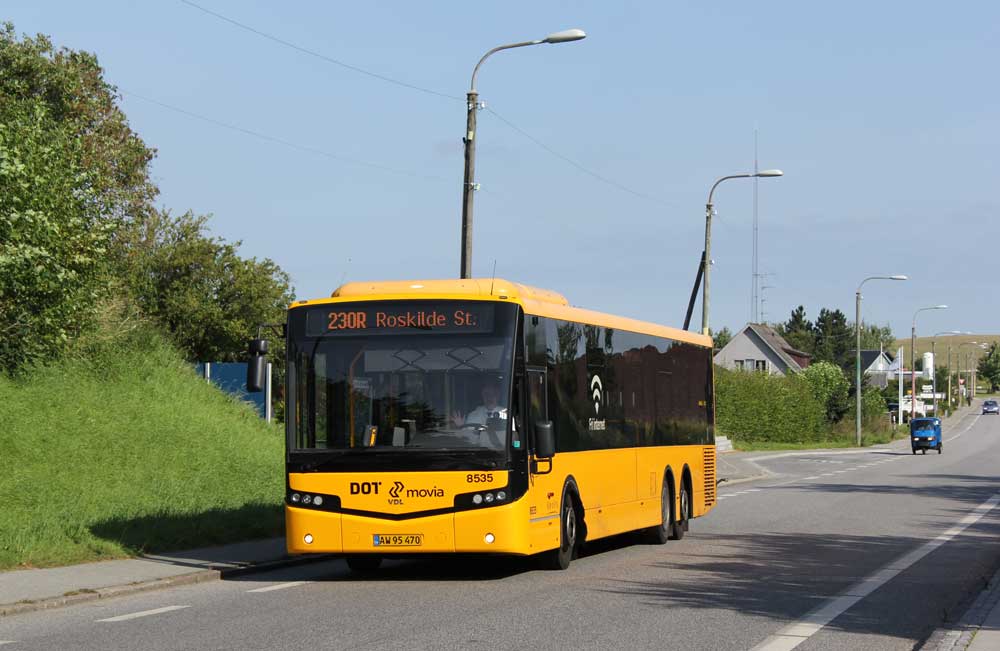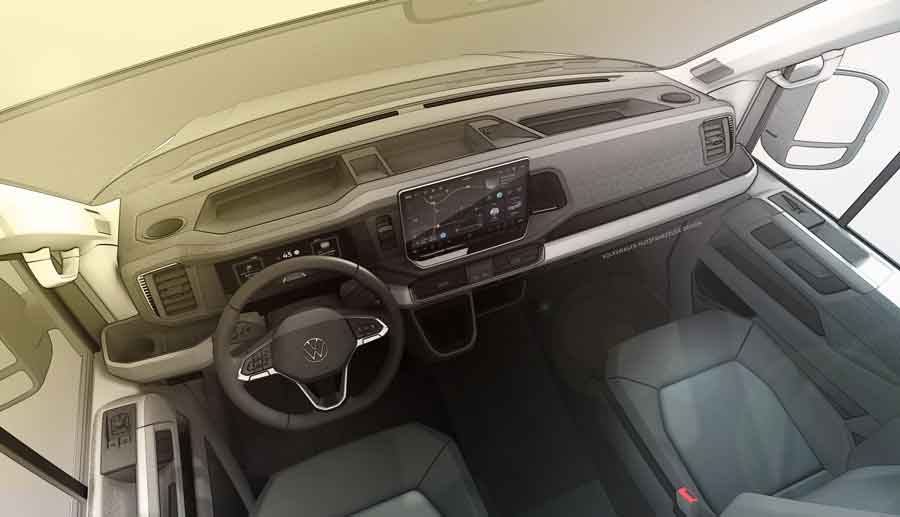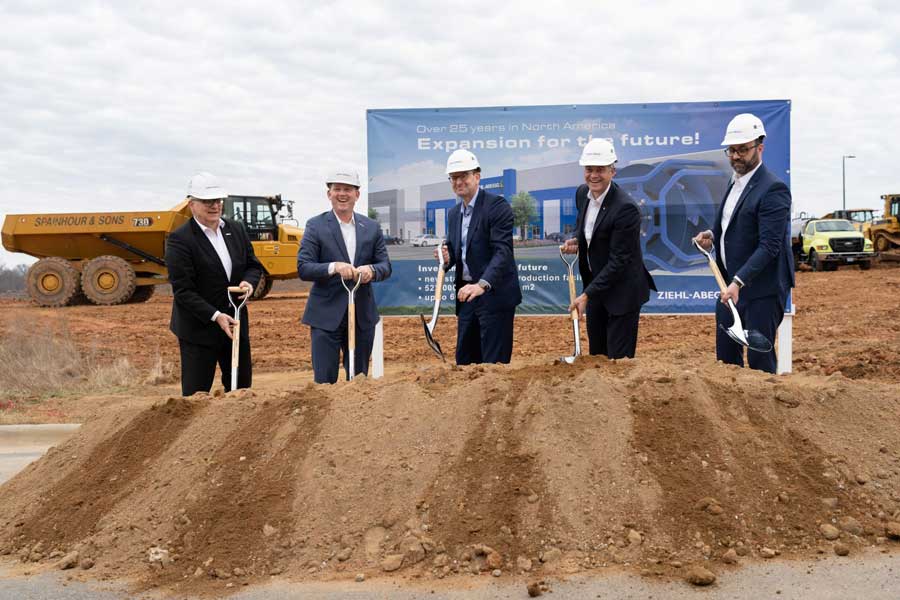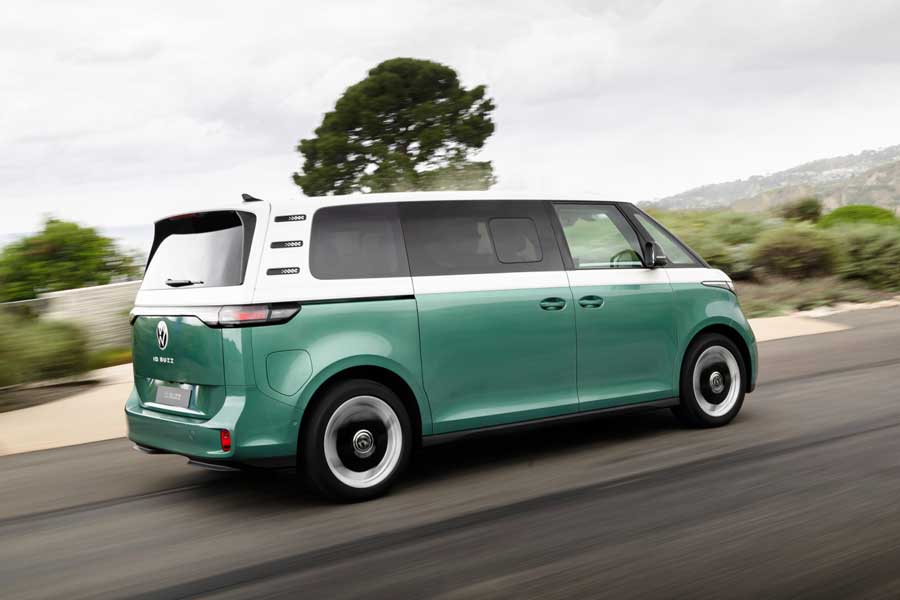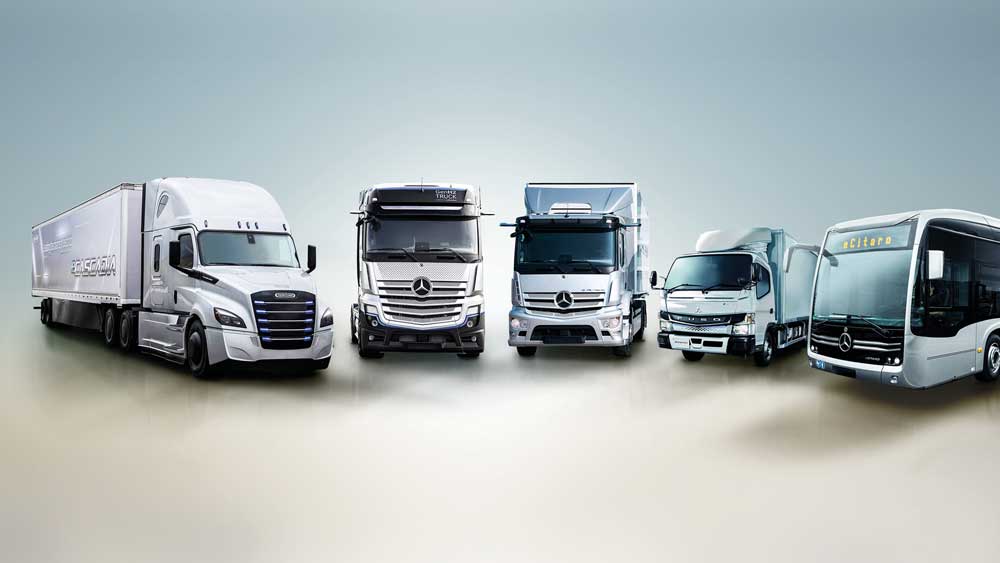In 2020, Keolis recorded revenues of €6.1 billion, down 7.5%, following a year marked by the pandemic.
The Group’s operational profitability (recurring EBITDA) amounted to €532 million, down 24%, penalised by the impact of the health crisis and by the decline in the number of passengers in the networks. After the implementation of action plans, the net impact of the health crisis was -€189 million.
As a result, recurring net profit is -€101 million (vs. €47 million in 2019).
Through rigorous management, the company has succeeded in maintaining its debt at €1,034 million, slightly lower than in 2019.
International activity was very strong from a commercial point of view, in particular with the award of the Group’s first commuter rail contract in Australia, in Adelaide, and the extension of the Boston commuter rail contract in the United States.
Activity in France has allowed Keolis to consolidate its leadership in urban transport with the renewal of several networks including Alès, Blois and Dreux and to consolidate its market share in suburban transport.
In 2020, Keolis continued its actions to support the energy transition, illustrated in particular by the launches of two major electric bus networks: the largest in Europe in the Netherlands (246 vehicles) and in Bergen, Norway (102 vehicles).
To strengthen its commitment to the challenges that face society, the Group’s actions are now reflected in its corporate purpose, which is set out today: Enhance everyday life in cities and communities by imagining and operating safe, smart and sustainable mobility solutions accessible to each and everyone.
Marie-Ange Debon, Keolis Chief Executive Officer: “Following the unprecedented health crises that we have been experiencing, I would like to express my heartfelt thanks to Keolis’ teams who have worked tirelessly and proved reactive and resilient in fulfilling our public service mission. Since the crisis began, the Group has worked hand-in-hand with public transport authorities to implement the necessary safety measures to protect passengers and employees and to adapt the transport offer wherever necessary. We were able to mitigate the financial impact of the pandemic by implementing rigorous action plans, which allowed us to preserve our balance sheet and contain our debt. All these actions will enable us to approach 2021 with confidence in order to return to the path of growth. Convinced of the key role that public transport will play in an economic, inclusive and sustainable recovery, and determined to put our expertise to work to meet these challenges, we have set out a corporate purpose that reflects our commitments.”
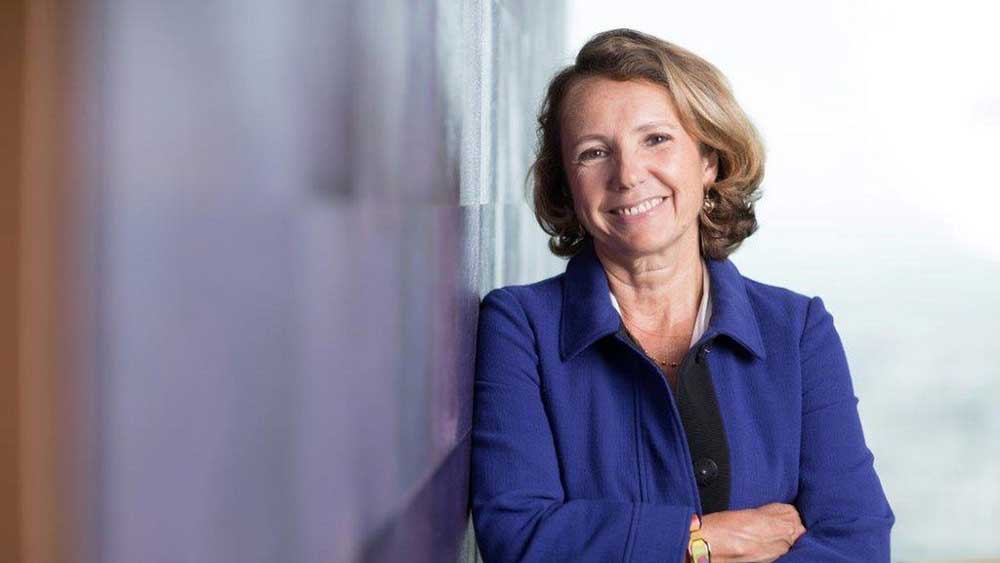
Resilient activity and financial foundations maintained, despite 2020 results heavily affected by the health crisis
The Group’s revenues amounted to €6.1 billion in 2020, down 7.5% (-€492 million) compared with 2019. This decline is primarily attributable to the impact of the Covid-19 crisis on all the Group’s activities.
The Group’s operational profitability (recurring EBITDA) decreased from €703 million in 2019 to €532 million (-24%) due to the impact of the health crisis (-€189 million). The EBITDA margin represents 8.7% of revenues, compared with 10.7% in 2019. Losses related to the Covid-19 crisis were limited thanks to the swift implementation of action plans in close partnership with public transport authorities.
Net financial debt (excluding IFRS16) is slightly down, thanks to strict financial discipline and controlled operational cash flow. It stands at €1,034 million compared with €1,121 million in 2019.
The debt leverage ratio (including IFRS16) stands at 3.9x. The availability of financing amounts to €1 billion, enabling the Group to support its growth into 2021.
Recurring net profit, Group share, is -€101 million (vs. €47 million in 2019).
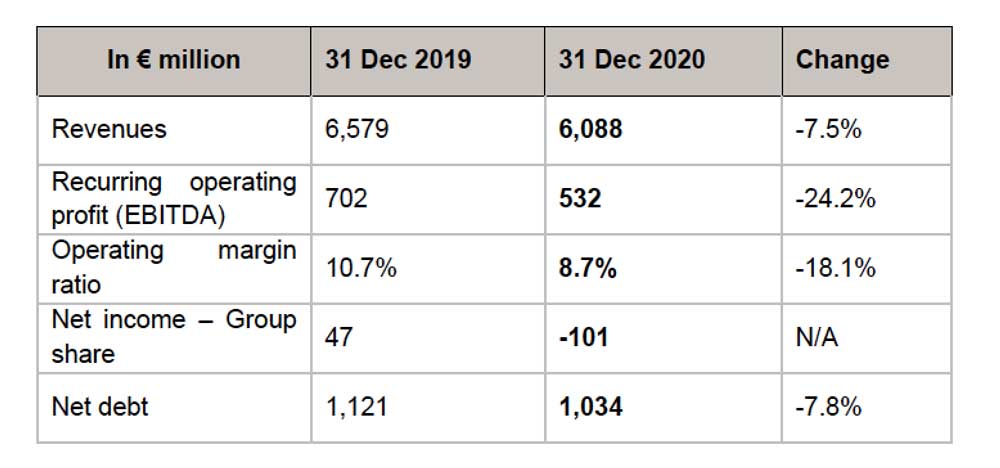
In addition, the Group has integrated exceptional accounting items, notably in markets particularly affected by the Covid-19 crisis: in Wales, with the government’s political decision to nationalise its rail network in a British market in the process of being restructured; in Germany, where the Group has adjusted its strategy in the face of structural difficulties in the rail sector; in the airport market, particularly in the Paris region, where the Group has closed its activities. These non-recurring items have no effect on the Group’s cash position.
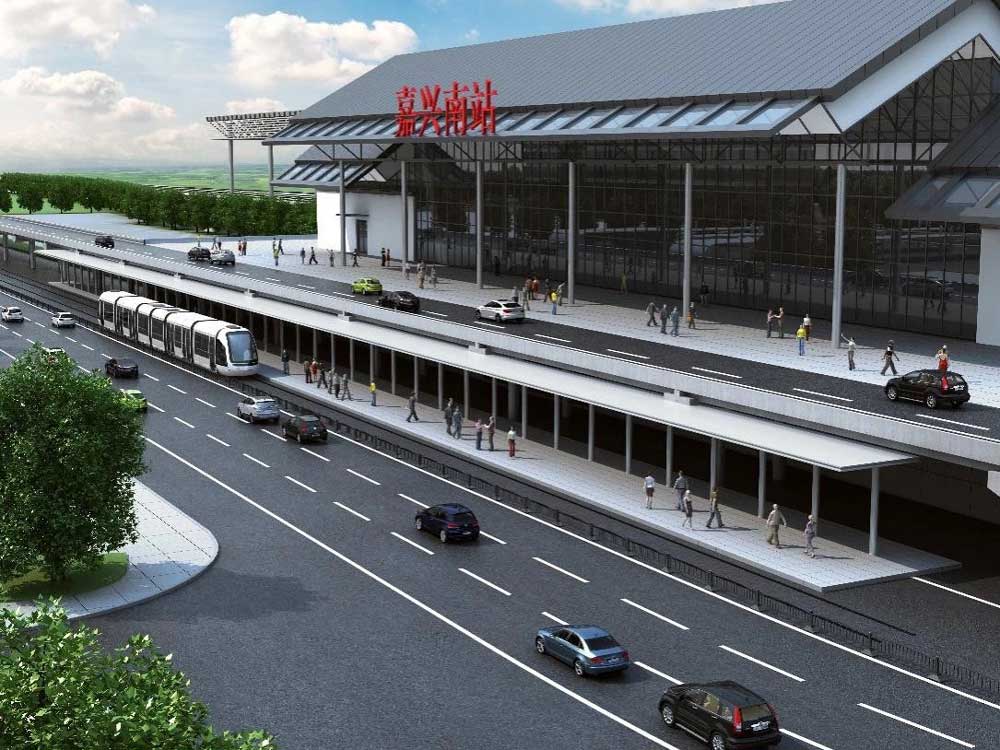
A strong and intact commercial dynamic throughout the world
New contracts awarded…
In a year that saw municipal elections in France, there were fewer calls for tenders than in previous years in urban transport outside of the Paris region. Nevertheless, Keolis obtained the renewal of contracts in Alès (9 years and 8 months / €120m), Blois (8 years / €100m), Châtellerault (5 years / €15m), Dreux (8 years / €90m), Tarbes-Lourdes (8 years / €68m) and Oyonnax (7 years / €18m).
The intercity activity enjoyed successes in a number of departments in France, particularly in Hérault, Bas-Rhin, Moselle, Oise, Gard and Pas-de-Calais. These wins have shored up Keolis’ market share on this segment.
Total revenues generated in 2020 by new and renewed contracts in the urban and interurban sectors following invitations to tender amounts to an annual global volume of €171 million.
Outside France, the Group’s business was very buoyant, with major contracts won in Australia, with the award in Adelaide of the Group’s first commuter rail contract in the country (8 to 12 years / €1.32bn); in Denmark, with the award of a contract for alternative energy buses in Greater Copenhagen (10 years to 12 years / €100m); in the United States, with the award of two bus networks in Virginia (5 years / €110m) and Southern California (5 years, with the possible extension for a further 5 years / €110m) and in China, with the award of Keolis’ second tram contract in the country (5 years).
It was a year that saw numerous contract extensions obtained for the Group’s flagship networks: those of the commuter rail contracts serving Boston (4 years, until 2026) and Washington, DC, (5 years, until 2025) in the United States; the contracts for the Southeastern rail network (2 years, until 2022) around London and the Docklands Light Railway, London’s automated metro network (4 years until 2025); and the largest bus contract in Stockholm (4 years, until 2026 / €500m), which notably stipulates the introduction of electric buses by the end of the contract.
As for EFFIA, Keolis’ parking subsidiary, following the acquisition of Mypark concluded at the end of 2019 and integrated in 2020, the Group secured a major success in Belgium by winning the concession for the construction of the future car park at Namur University Hospital.
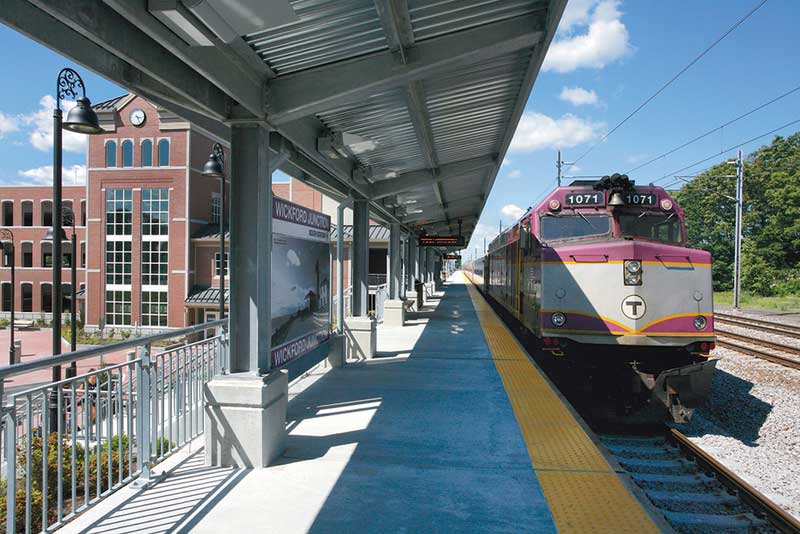
A year marked by constant agility and adaptability, stringent action plans and accelerated innovation in close partnership with public transport authorities
An adapted offer, and rigorous action plans
Working hand-in-hand with its public transport authority (PTA) partners, the Group has adapted to changing travel needs, modified by the constraints involved in needing to protect people’s health, by making adjustments to its services. These have involved extended services during the day to encourage compliance with social distancing rules, or reductions on certain night-time and evening services.
To limit the impact of the crisis on its accounts and for its PTA partners, Keolis has shown strict financial discipline. General cost-saving measures were taken, resulting in greater stringency in the Group’s operating expenses. It also decided to discontinue airport activities in particular.
In total, the cost-saving plans implemented by the Group amounted to €330 million, reducing the impact of the health crisis from €519 million to €189 million.
Furthermore, contractual adaptations were initiated with the PTAs at the start of the crisis as part of a partnership-based approach to ensure a balance between maintaining the transport offer and mitigating the impact of lost passenger revenue and costs induced by additional hygiene measures. Most of these contractual adjustments have led to agreements, thanks to the close relationship that Keolis has maintained for several years with PTAs.
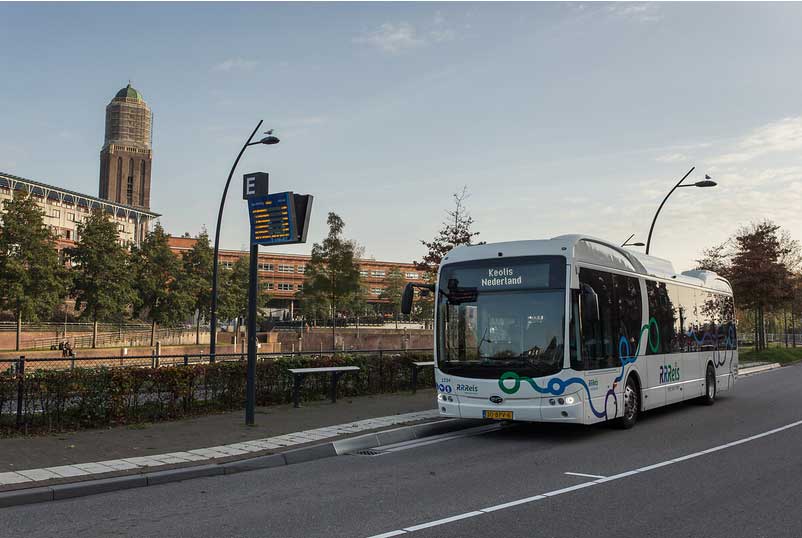
Accelerating innovation
To maximize health protection, the Group has deployed new measures such as the ’ozone cube’ in Besançon which harnesses ozone’s capacity as a powerful disinfectant, or in Lyon, where automatic contactless hand sanitisers dispensing a natural and environmentally friendly gel have been installed.
In Shanghai, Hyderabad and Doha, in addition to cleaning and disinfection measures, passenger temperature monitoring is used to detect and isolate symptomatic passengers.
Furthermore, the development of paperless ticketing solutions (m-ticket, text message, payment by bank card), which limits physical contact, has been stepped up in France. In Amiens, an open payment solution was launched in August 2020, allowing passengers on the network to pay for their tickets with their bank cards. In Quimper, a text message ticket has been valid on the entire network since June 2020. By the end of 2020, nearly 70 networks in France were offering digital payment solutions, compared with 18 at the end of 2019.
The Group is also testing innovations to inform passengers in real time of the number of passengers on board vehicles, and to reassure them about maintaining physical distancing. In Caen, Keolis has launched, in partnership with start-up company Zenbus, a city-centre shuttle service where real-time ridership information is provided through counting detectors positioned at the doors of the shuttle; passengers can thereby decide whether they want to take the shuttle or switch to another travel solution.
In health transport, Keolis Santé and JUSSIEU Secours launched the first mobile remote consultation unit in France in May 2020, in partnership with the Vendée department. This innovation has facilitated access to healthcare for patients who are isolated or live far from hospitals with over 100 remote consultations undertaken since its launch.
Regarding autonomous mobility, the Group has pursued its innovative approach.
In Sweden, in January 2021, the Group introduced autonomous electric vehicles in Gothenburg, integrated into the traffic and into the city’s public transport network. In Australia, Keolis is conducting numerous trials, notably near Adelaide, in Renmark, where an autonomous shuttle service has been operating on open roads since February 2021. This is the only mode of public transport in the city.
In France, the Group reached a new milestone in autumn 2020 with the launch of its first autonomous shuttle without an operator on board in Châteauroux, at the National Centre for Shooting Sports (CNTS). In Saint-Quentin-en-Yvelines, Keolis is preparing to launch a new regular autonomous shuttle transport route, on behalf of Île-de-France Mobilités, the public transport authority for the Île-de-France region.
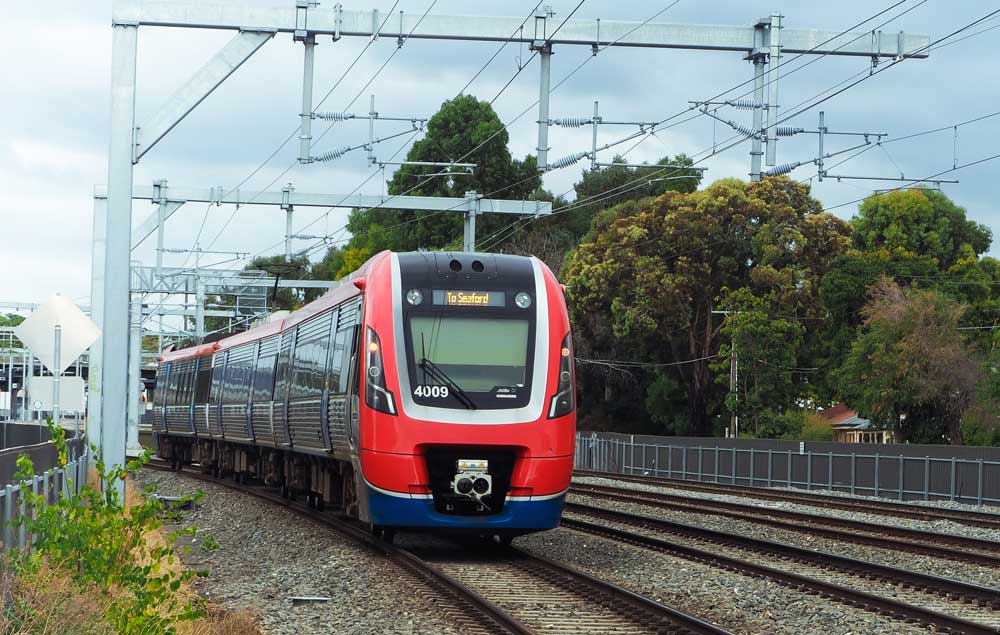
Development ambitions supported by the essential role played by public transport for a sustainable economic recovery
For 2021, the Group is resolutely confident, particularly regarding the return of passengers to the transport networks that will accompany the economic recovery and the return of social interaction. This increase has already been observed when lockdowns have been lifted. This was the case in France in summer 2020 and in China and Australia for example, where the health risk has receded. In Shanghai, ridership of the Songjiang tram and Pujiang automated metro networks has effectively reached 90% and 100% of pre-crisis levels, respectively. Furthermore, this increase will be fuelled by infrastructure recovery plans, implemented in many countries, that are making public transport the mainstay of sustainable and inclusive development.
The Group also remains confident in its know-how and professional expertise that set it apart and are crucial, particularly with regard to markets that are opening up to competition, such as those of Paris’ outer suburban periphery and the automated metro lines of the Grand Paris Express. In February 2021, Keolis’ ambitions were bolstered when it won two major contracts to operate bus networks in the west of the Île-de-France region, and the contract for the Thionville urban network in eastern France, which was previously operated by a local public company.
Continuing with the Group’s transformation
Reiterating the commitment to energy transition
With its longstanding commitment to advising and accompanying its PTA partners and passengers in the energy transition, Keolis’ objective is to promote and deploy more sustainable mobility solutions for cities and communities.
After a watershed 2019 in terms of electric mobility, marked by the launches of several alternative energy mobility services such as the 100% electric bus rapid transit (BRT) services in Amiens and Bayonne-Anglet-Biarritz and the 100% hydrogen BRT service in Pau, the Group confirmed its commitment in 2020, notably by launching two major electric bus networks outside of France.
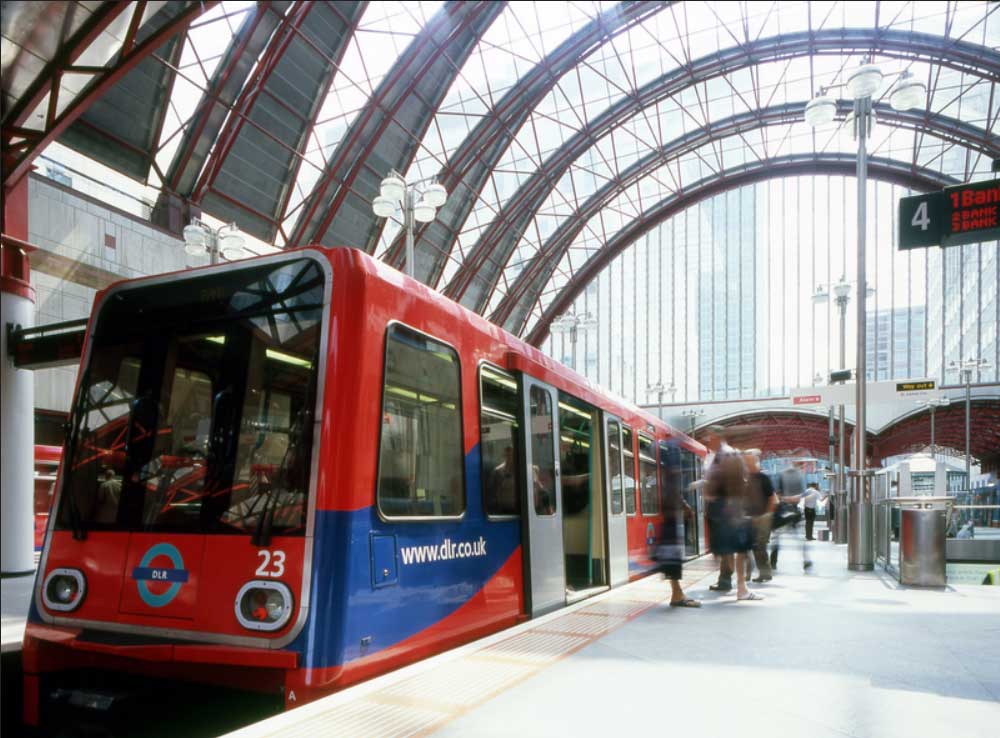
In the Netherlands, in December 2020, the Group launched Europe’s largest electric bus network (246 vehicles). These electric buses, expected to travel 25 million kilometres per year, will lead to a reduction of nearly 15,000 tonnes of CO2 emissions.
In Norway, in December 2020, Keolis began operating the 100% alternative energy bus network in Bergen, the Group’s first bus contract in the country. Consisting of 138 buses, of which 102 are electric, the fleet runs exclusively on alternative energies (electric and HVO), which will reduce CO2 emissions by around 85% during the ten-year duration of the contract, compared with a fleet of conventional vehicles.
In the United States, Keolis won the contract to operate the Victor Valley bus network in Southern California in the autumn of 2020. This includes a fleet of nearly 130 vehicles, 90 of which run on natural gas.
In France, Keolis also launched a BRT line in Sophia Antipolis in March 2020. The line runs exclusively on natural gas, the form of energy in which the Group has the longest experience (over 20 years).
In total, the Group operates around 4,000 vehicles running on alternative energies, representing nearly 20% of its total bus fleet, and is aiming to become the reference operator in the energy transition.

Keolis sets out its corporate purpose, demonstrating its commitment to the challenges facing society
In the face of climate, societal and economic issues, Keolis wants to devote its day-to-day and long-term actions to tackling the challenges and enhancing quality of life in cities and communities. This explains the participative process initiated by the Group which led to the formalisation of its corporate purpose:
“Enhance everyday life in cities and communities by imagining and operating safe, smart and sustainable mobility solutions accessible to each and everyone”.
This corporate purpose is an extension of the Group’s values, “We Imagine, We Care, We Commit” adopted in 2015. It reflects the social and environmental commitments that the Group intends to make to serve the public interest and for the benefit of all its stakeholders including public transport authorities, passengers, employees. It is also consistent with the Group’s contributions to achieving the United Nations’ Sustainable Development Goals.
Local public transport, which contributes to the development and appeal of communities, is one of the essential services lying at the heart of the economic, social and environmental recovery in all the countries in which the Group operates.


